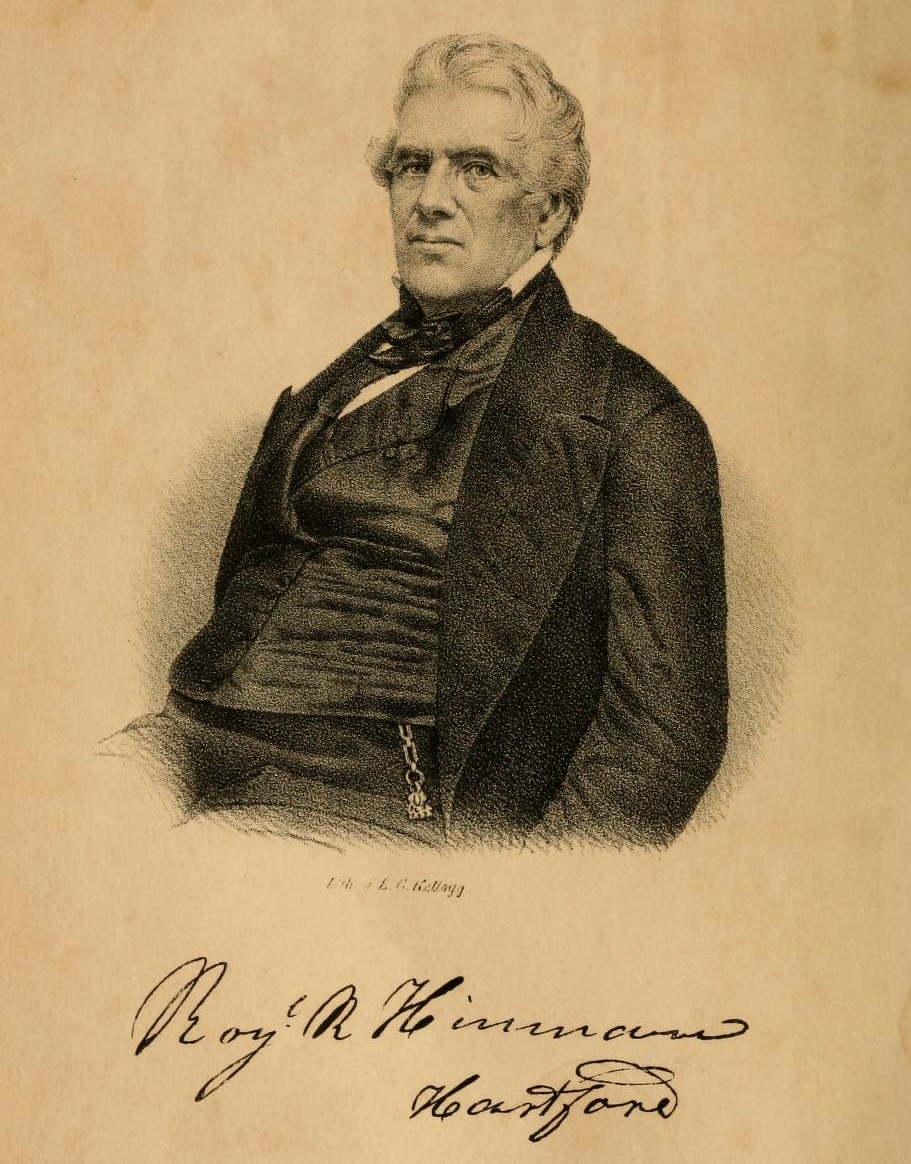The Hon. Royal R. Hinman died in New York on Friday, aged eighty-four years. His remains were brought to this city on the noon express train, and immediately upon their arrival will be conveyed to Spring Grove Cemetery for burial.
Mr. Hinman was a son of General Ephraim Hinman, who served in the Revolutionary war after the close of which he was promoted by regular grade to be brigadier general. For about thirty years he was a merchant in Roxbury (then a society of Woodbury), where he at one period owned one thousand acres of land. He was a gentleman of the old school; dressed his hair with pomatum and powder, and his attire was also that of former days up to a short time before his death. The subject of this sketch prepared to enter college with Azel Backus of Bethlehem, and graduated at Yale in 1804 in the class with John C. Calhoun, Henry R. Storrs, Dr. John Pierpont, Dr. Abel McEwen, and other of that prominent class. He taught an academy in Virginia a part of 1804-5 when he returned to Connecticut and entered, as a law student, the office of the Hon. D. S. Boardman of the New Milford, where he continued about one year and then entered the office of the Hon. Tappan Reeve and J. Gould, Esq., in Litchfield. He was admitted to the bar in 1807, and, after a practice of twenty years in Roxbury, removed to Southington, where he pursued his profession about two years and then came to Hartford, having been elected Secretary of State as successor of the Hon. Thomas Day. Seven years in succession he was chosen to this office, on retiring from which abandoning his profession. He acted while in Worthington as a judge and clerk of probate; was about ten years postmaster at Roxbury, and magistrate over twenty-five years. One year, 1819, he was brigade major and inspector in the 6th brigade Connecticut infantry; four sessions a member of the General Assembly, and was nominated for a member of Congress upon the first Jackson ticket in the State. The ticket being changed neck year he was nominated for Secretary of State, to which he was elected in 1835, as above stated. He was a member of the Linonian Society, Yale College; honorary member of the Parthenian Society, Trinity College, December 2, 1843, etc. In 1844 he was nominated for Postmaster of Hartford, but was rejected for being neither was a Van Buren of Clay adherent. In 1844 he was appointed buy the President military store-keeper attached to the ordnance department, and connected with the Springfield armory, but he declined the appointment. In 1844 he was appointed collector of customs for the port of New Haven, and superintendent of lighthouses for that district, which he held till the following 4th of March. He was a member of the national convention in Baltimore in 1844; was an original member of the Connecticut Historical Society, and an honorary member of several state historical societies. In 1835-6 he was appointed by the legislature of Connecticut, chairman of two committees with the Hon. Elisha Phelps and Leman Church, Esq., first to revise and publish the private acts of the State, particularly the sets of incorporation for a given period, which last comprised a volume of over 1600 pages. He was a few years later appointed with the Hon. Thomas C. Perkins of this city, to again revise the public acts, Mr. Perkins doing the principal work. He published several works to preserve and perpetuate the history of his native state, "and that noble body of men, the first Puritan settlers." The history of the part taken by Connecticut in the war of the Revolution, published in 1842, was complimented by the legislature in 1853 by a unanimous vote in both houses to distribute one volume to each town in the State, one to each State and territory, etc. He also published a volume of 372 pages composed of official letters (many of them never before published) between the Kings and Queens of England, and the different first governor of the colony of Connecticut. These facts we compile from "A family record of the descendants of Sergeant Edward Hinman, who first appeared in Stratford in Connecticut about 1650," which was compiled bu the deceased, and published in 1836 by Case, Lockwood & Co. In this record he refers to his own name as follows: "The name of Royal was acquired in the following singular manner: My. Hinman was a classmate in college with John Chester, D. D., now lately deceased of Albany, and they were intimately friends before and after they entered college. A catalogue of the Freshman class, as was the custom, was to be collected by a committee of the class, and published alphabetically. Dr. Chester was one of the committee, and wishing to pay his friend a compliment, without his knowledge, published the name of Royal, as his first Christian name, was has since been used as on of his names, when before it was only Rafe."
ADVERTISEMENT
BY
Looking for more information?

 Ward Hartmann
Ward Hartmann 